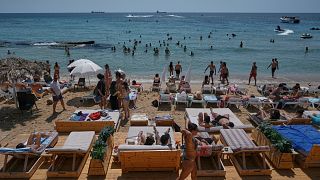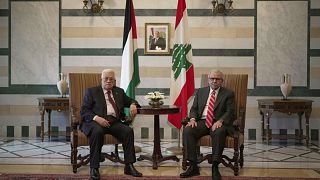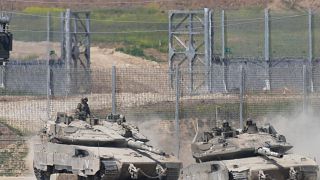Lebanon
Amos Hochstein a senior adviser to President Joe Biden stated on Wednesday that it is essential to capitalize on the chance for diplomatic intervention to resolve the Israel-Hamas conflict in Gaza and the persistent violence in Lebanon.
Hochstein mentioned that he and Berri agreed there are "no more valid excuses from any party for any further delay" in achieving a cease-fire.
"Speaker Berri and I had a good conversation about the situation in Lebanon and the need to (de)escalate tensions across the Blue Line and across the region. ."
Hochstein, who has been conducting shuttle diplomacy between Lebanon and Israel for several months, addressed the media after meeting with Lebanese Speaker Nabih Berri, as the region anxiously awaits potential retaliatory attacks on Israel from Iran and the formidable Hezbollah group.
Hochstein said, "The time is now to get us into a better direction. And for the Lebanese people, my message is clear, what President Biden has said publicly over the last several days and the message that he has sent in his joint statement together with the leaders of Qatar and Egypt, to return to talks with urgency on a cease-fire in Gaza that releases the hostages and sets the conditions to end this war. And here in Lebanon, we believe we can get to end of the conflict now. "
Hochstein stated in Beirut that as tensions continue to rise and daily conflicts persist, the likelihood of accidents and mistakes increases.
This could lead to unintended targets being struck, potentially resulting in an escalation that spirals out of control.
Cease-fire negotiations are set to continue in Doha on Thursday, involving Hamas and Israel with the help of mediators from Qatar, Egypt, and the United States.
Since October 8, Hezbollah and Israel have exchanged attacks following the unexpected assault by Hamas on southern Israel, which ignited the current Israel-Hamas conflict in Gaza.
Hezbollah has stated that it will cease its strikes on northern Israel if a cease-fire is established in Gaza.
The initial skirmishes along the troubled border between Lebanon and Israel have escalated significantly.
Last month, an unusual Israeli airstrike in southern Beirut resulted in the death of Hezbollah’s top commander, who was accused by Israel of launching a rocket into Majdal Shams in the Israeli-occupied Golan Heights, which claimed the lives of 12 young people.
Shortly after, an explosion in Iran killed Hamas leader Ismail Haniyeh, with Tehran attributing the incident to Israel.
In the last two weeks, the region has been extremely tense, as diplomatic efforts strive to prevent the prolonged regional tensions from escalating into full-scale war.
Both Iran and Hezbollah have expressed their determination to carry out retaliatory actions.
Palestinian health officials report that Israeli airstrikes throughout the Gaza Strip overnight and into Wednesday resulted in the deaths of at least 17 individuals, including five children and their parents.
These latest attacks occurred just before new discussions aimed at achieving a cease-fire in the ongoing 10-month conflict.
The United States, Qatar, and Egypt are working to facilitate an agreement, but significant differences remain between the parties despite months of indirect talks.
Hochstein visited Lebanon following his meeting with Israeli officials on Tuesday.
He is set to meet with caretaker Prime Minister Najib Mikati and the chief of Lebanon's army.













01:55
US contractors say colleagues fired live ammunition at Palestinians seeking food
01:04
Israeli airstrike on popular Gaza City beach café kills at least 30
Go to video
Families grapple with life in the wake of the Israel-Iran Conflict
01:42
Gaza residents welcome rare organized aid delivery after months of chaos and hunger
01:30
Israeli military says seven soldiers killed during operations in Gaza
00:58
Israel-Iran ceasefire appears to hold amid tensions and diplomatic juggling